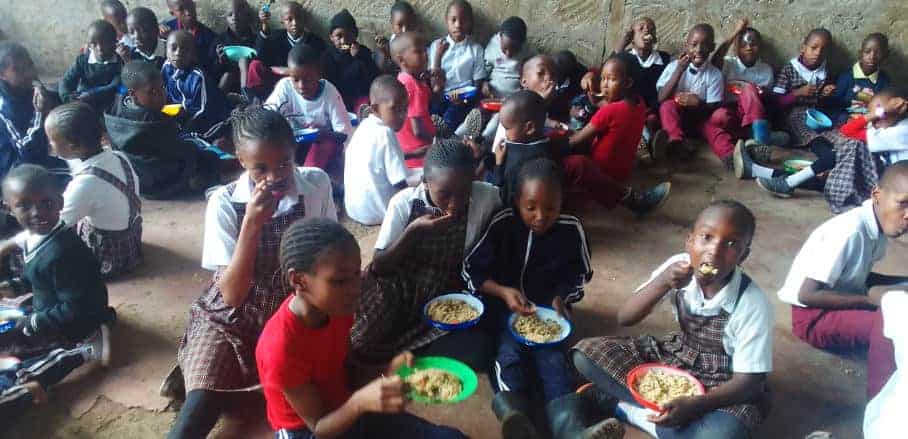The Right to Food: School Feeding Initiatives and Inequality in Kenya’s Urban Informal Settlements
Interconnected crises are fuelling food insecurity and negatively impacting children the most. Serah Kiragu-Wissler is convinced: School feeding programmes can push processes towards the realisation of a right to food.
Since the beginning of the COVID-19 pandemic, the world has been facing heightened food crises. The Russian invasion of Ukraine has disrupted agrifood supply chains, especially for countries that import grains from Ukraine. At local levels, climate change – particularly droughts in the Horn of Africa – threatens food security and livelihoods through diminishing agricultural yields.
Food Insecurity and Malnutrition
The food crisis of 2008-2009 has taught us that the price spikes of staple foods during the hunger crises mainly affected cities, particularly people living in informal settlements and economically vulnerable areas. Due to structural reasons such as deeply entrenched inequalities, poverty, and poor governance, these communities are especially vulnerable to shocks. Children in particular bear the heaviest brunt of food insecurity given that they are still growing and developing, with long-term consequences on their health and well-being.

Children at lunch in Mukuru, Nairobi. ©TMG Research
The Urban Food Futures action research programme conducted by TMG Think Tank for Sustainability applies a right-to-food approach. In cooperation with local actors, the programme co-creates innovations that offer not only immediate relief to those suffering from food insecurity but also address the structural reasons for food insecurity. One of the programme’s research pathways considers school feeding, based on its crucial role in addressing food insecurity and malnutrition in children. Regular nutritious meals to children contribute to immediate nutritional needs while also fostering long-term positive outcomes in education, health, and community resilience.
Kenya Making Progressive Steps on School Meals, but Disparities Abound
In Kenya, the city of Nairobi provides a good action research case given its blend of urbanisation, inequalities in wealth distribution, and access to food. Kenya’s school feeding initiatives are managed by the National School Feeding Council and date back to the 1960s. The expansion of school feeding programmes in the Seventies, Eighties, and Nineties focused on arid and semi-arid areas and leveraged international donor support, mainly the World Food Programme.
In 2009, Kenya’s government took funding responsibility for the school feeding programme under the home-grown school feeding model that incorporates food procurement from local farmers and traders. Although national government-sponsored school feeding in Kenya reaches children in primary school and geographically targets schools in arid and semi-arid lands as well as in Nairobi’s unplanned settlements, the support hardly reaches children in informal settlements. A recent entry into school feeding by the new Governor of Nairobi City County has not solved the issue. Dubbed Dishi na County, the programme focuses on public schools and is modelled along centralised kitchens from which lunch meals are distributed to a cluster of schools.
One such informal settlement of Nairobi is Mukuru, where only six public schools host around 9,000 children out of more than 120,000 school-aged children. Some of these children access education through community and faith-based complementary, non-formal schools registered mainly under the Ministry of Gender, Children and Social Services. These schools remain under the Ministry of Education’s radar as they do not meet its registration standards. Consequently, they do not receive state funding – neither teachers nor books nor school meals. A poverty penalty is meted out to children whose only crime is being born of poor parents living in informal settlements of Nairobi.
Dialogue for an Inclusive and Sustainable School Feeding Model
Kenya’s National School Meal and Nutrition Strategy commits to ensuring all children in pre-primary and primary schools receive at least one nutritious meal per school day. While the County Government of Nairobi acknowledges that all children deserve school meal support equally, it admits to not having an engagement strategy with the complementary schools as these do not belong to direct government operations and management structures.
The action research on school feeding aims to facilitate and accompany a process through which the Nairobi County Government, parents, school managers, and researchers can co-develop a replicable school feeding model that caters for the specific challenges and capacities of schools in the informal settlement of Mukuru.
Affordability, Inclusion, and a Progressive Realisation of a Right to Food
Pricing a school meal is critical. From the ongoing research, only a quarter of parents in Mukuru manage to complete the school meal fee by the end of a term. Merely 60 per cent of parents can afford to pay US$0.14 per meal plate, while five per cent of parents cannot afford to pay for a meal at all.
The multi-actor dialogue is challenged to devise mechanisms that address not only the intermittent financing of school meals by parents but also provide for managing children whose parents cannot afford to pay.
Moreover, the dialogue must innovate operations and oversight governance structures that provide for ownership and sustainability of the model by the government, school managers, and parents. Social grants by the Kenyan government play a critical role in stepping up its commitment to the right to food for all children.
School feeding as an entry point into right-to-food discourse will provide the necessary how-to lessons in strengthening the progressive realisation of a right to food especially for the often-marginalised segments of communities in urban informal settlements.
